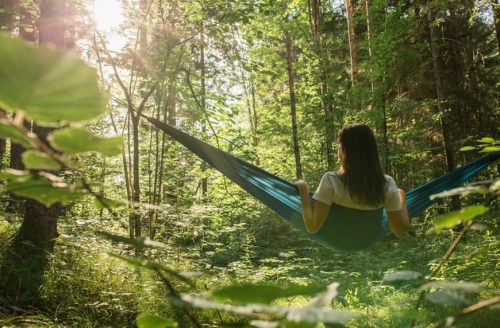Are mind-altering magic mushroom retreats the future of wellness travel?
Psychedelic fungi are popping up at retreats in Jamaica, the Netherlands, and beyond, promising spiritual and mental health benefits. Here's what to expect.

When it comes to self-care vacations, there are two ends of the spectrum: Super-indulgent getaways that revolve around chasing highs (hello, 9 a.m. poolside margaritas), and traditional wellness retreats, where the only drug you’re ingesting is the caffeine in your matcha latte.
But just as we’ve seen cannabis-fueled women’s getaways start to infiltrate the healthy travel world, a new kind of trip is emerging; one that blends mind-altering substances with deep healing: psychedelic mushroom retreats.
The most established of the bunch is MycoMeditations, which has been hosting 7- and 10-day escapes in Jamaica for nearly three years. This month, the company is holding its first-ever women-only retreat, with co-facilitators including PhD-holding research scientists Katherine MacLean and Rosalind Watts. (Another trip is planned for October 2018.)
In London, The Psychedelic Society is also organizing a women’s mushroom retreat, scheduled for September 20-24 in the Netherlands. And based on a quick search of plant medicine travel site Open Mind Trips, there are scores of retreat centers in Mexico, Peru, and other remote destinations that offer mushroom ceremonies led by local shamanic healers.
“People are looking for a deeper meaning in their lives. Increasingly, [they] are looking to indigenous traditions… many of which actively use ceremonies involving some sort of mind-alteration.”
These escapes are not for “party trippers,” emphasizes MycoMeditations founder Eric Osborne—although they do often include nature excursions, spa treatments, and other hallmarks of a more hedonistic, or shall we say, indulgent, vacation. Rather, they’re drawing people of all ages and ethnicities, many of whom have never used psychedelic drugs before but are intrigued by recent research that illustrates their effectiveness in treating mental health issues—not to mention the connection to spiritual transcendence that can be found on a trip.
“Career, status, professional success, and financial wealth don’t cut it anymore,” says Stefana Bosse, director of experience at The Psychedelic Society. “People are looking for a deeper meaning in their lives. Increasingly, [they] are looking to indigenous traditions… many of which actively use ceremonies involving some sort of mind alteration, be they induced by psychedelics or otherwise.”
Sure beats coming back from your beach vacation with nothing more than a hangover, tan lines, and a hefty credit card bill, huh?
Want to, um, dig a little deeper? Keep reading for an inside look at the new world of psychedelic mushroom retreats.

Why take a mushroom retreat?
Although plant medicine tourism is generally growing in popularity, mushrooms are known to be a safer tool than substances like ayahuasca, which can be fatal if administered incorrectly. “A lot of toxicology studies [show] psilocybin mushrooms are the safest [drug] you can put in your body—you can’t overdose, and the worst they do physiologically is cause an increase in blood pressure,” says MacLean, who has conducted clinical trials of psilocybin—the main chemical component of psychedelic mushrooms—at Johns Hopkins University. She says the only people who should never use psychedelics are those with schizophrenia or bipolar disorder (or a direct relative with one of those conditions), and that if you’re on antidepressants or antipsychotic medications, you should check in with an expert before experimenting.
That said, just about anyone else is considered a good candidate for a mushroom retreat. “Our retreats are for anyone who’s trying to improve the quality of their life,” says Osborne, a former middle-school teacher who has been using, growing, and leading people through ‘shroom ceremonies for the past 20 years. He notes that many of his retreat attendees suffer from treatment-resistant depression and persistent anxiety, and that psilocybin provides a way for them to “get pretenses out of the way and reveal the deeper nature of the situation.”
MacLean agrees tripping on mushrooms could be particularly helpful for those with anxiety, as well as cigarette and alcohol addiction and severe headaches. But even if you’re just going for personal growth and experimentation, she says, you’ll likely get something valuable out of the experience.
“The group setting, the natural mushrooms, and being in a place where it was legal—all contributed to much lower rates of anxiety, paranoia, and distress than I saw at Johns Hopkins.”
What’s more, she adds, eating mushrooms at a retreat may actually be a better option than taking synthetic psilocybin solo in a clinical setting. “The research groups and the funders are saying they’re offering the safest, most-effective access to psychedelic medicine. I don’t think that’s true. The group setting, the natural mushrooms, and being in a place where it was legal—all contributed to much lower rates of anxiety, paranoia, and distress than I saw at Johns Hopkins,” says MacLean, referring to the MycoMeditations retreat she attended last November.
And, especially for beginners, it’s certainly preferable to experimenting with mushrooms on your own, says Bosse. “At a good retreat, the facilitators will support you in preparing yourself for the experience and create an environment so as to minimize the potential for a traumatizing experience and maximize the potential for a therapeutic, even mystical one,” she says. “At a retreat you’ll also know exactly what substance you’re using, where it’s coming from, and will receive expert guidance on dosage. The combination of specifically chosen music to help take you into the depths of your soul, with the support of experienced guides, can allow you to go to places you wouldn’t otherwise ever visit.” (And no, she’s not talking about a waterfall hike or a pink sand beach.)

What to expect during—and after—your “trip” and retreat
So what does a magic mushroom retreat look like, exactly? Not a whole lot different than your average wellness retreat, actually—I mean, except for the hallucinations. MycoMeditations guests start off their week by setting an intention, which they carry with them during their 3–4 dosing sessions, each one increasing in intensity. After each trip, the group comes together to discuss their experience. And there’s plenty of time to explore the local surroundings or sit with their experience in the interim. The Psychedelic Society’s upcoming women’s retreat will look similar, albeit for fewer days, a sliding price scale (standard tickets are £500/roughly $700), and with fewer dosing sessions. Meditation, breathwork, bodywork, and time in nature are also all a part of the itinerary.
As for the mushroom experience itself, it’s different for everyone. “You will likely have many new insights about your life, about relationships in your life, about your behavior in different situations,” says Bosse. “Often, there can be a lot of pain that surfaces. But it’s my experience of having supported over 200 people through ceremonies now that a lot of growth and healing happens through that, and people’s lives feel more wholesome and authentic afterwards.”
Still, that’s not to say that mushrooms are a magic cure-all and you’ll return home free of all your neuroses. “Psilocybin is not something you take one or three times and all of a sudden your life is better,” says Osborne. “Very often, you learn difficult lessons—you see that maybe you need to start backing out of certain situations and choosing different behaviors. It requires a really active change in daily life.”
“Often, there can be a lot of pain that surfaces. But it’s my experience that… people’s lives feel more wholesome and authentic afterwards.”
To that end, follow-up calls with MacLean are included in the price of a MycoMeditations retreat (which start at $1,800). MacLean also recommends preparing for post-retreat life before you leave—starting a mindfulness practice, planning to take it easy at work during your first few weeks back, and figuring out who your support team will be, whether it’s a yoga instructor, energy healer, or psychedelic-friendly therapist. (You can find a directory of the latter at Psychedelic.Support.) She also stresses that unless you’re going home to a dangerous situation, you shouldn’t make any drastic changes to your life as soon as you return to reality, as tempting as it may be. “I really encourage people to sit with the experience for up to six months,” she says. “That way, you can really assess whether [your desire for change] was just a fleeting experience.”
What’s most important, says Osborne, is your mindset going into the retreat. “Approaching it with a deep respect and knowing how profound the experience can be is beneficial,” he says. “But approaching it with skepticism or fear is going to limit the potential benefits.”
And it goes without saying that you should ensure you’re working with an experienced facilitator. “It’s worth making an effort to investigate what qualifications and background any potential Western helpers have, as well as what the shaman’s reputation is [if you’re going that route],” says Bosse. “This is not something you want to be too easygoing about. You really delve deep into other realms and it is so important that these spaces are held by people with experience, sensitivity, and integrity.” Happy trails—ones paved with rainbows and stars, perhaps?
*Well+Good does not endorse illegal drug use by publishing this article
Mushrooms aren’t the only psychedelic finding favor with a broader audience these days. Find out what happened with two writers micro-dosed LSD for depression and on-the-job creativity.
Sign Up for Our Daily Newsletter
Get all the latest in wellness, trends, food, fitness, beauty, and more delivered right to your inbox.
Got it, you've been added to our email list.








